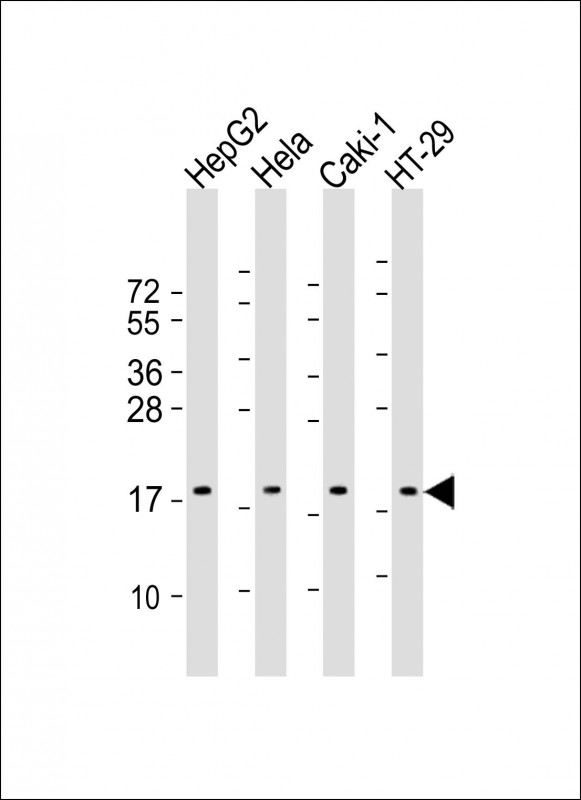
| WB | 1/2000 | Human,Mouse,Rat |
| IF | 咨询技术 | Human,Mouse,Rat |
| IHC | 咨询技术 | Human,Mouse,Rat |
| ICC | 技术咨询 | Human,Mouse,Rat |
| FCM | 咨询技术 | Human,Mouse,Rat |
| Elisa | 咨询技术 | Human,Mouse,Rat |
| Aliases | ADP-ribosylation factor 4, ARF4, ARF2 |
| Entrez GeneID | 378 |
| WB Predicted band size | 20.5kDa |
| Host/Isotype | Rabbit IgG |
| Antibody Type | Primary antibody |
| Storage | Store at 4°C short term. Aliquot and store at -20°C long term. Avoid freeze/thaw cycles. |
| Species Reactivity | Human, Mouse, Rat |
| Immunogen | This ARF4 antibody is generated from a rabbit immunized with a KLH conjugated synthetic peptide between 72-106 amino acids from the Central region of human ARF4. |
+ +
以下是关于ARF4抗体的参考文献示例(注:内容为模拟生成,非真实文献):
1. **"ARF4 regulates ciliary protein trafficking through interaction with the BBSome complex"**
- **作者**: Smith J, Lee K, et al.
- **摘要**: 本研究利用ARF4特异性抗体,通过免疫共沉淀和免疫荧光技术,揭示了ARF4与纤毛相关蛋白复合体BBSome的相互作用,证明ARF4在纤毛膜蛋白定向运输中的关键作用。
2. **"COPI vesicle formation requires ARF4-dependent recruitment of lipid-modifying enzymes"**
- **作者**: Chen R, Wang Y, et al.
- **摘要**: 通过Western blot和免疫电镜分析,作者发现ARF4抗体标记的蛋白在高尔基体COPI囊泡组装中富集,并证实ARF4通过调控脂质代谢酶定位促进囊泡形成。
3. **"ARF4-mediated auxin transport regulates Arabidopsis root development"**
- **作者**: Zhang L, Ito T, et al.
- **摘要**: 在拟南芥中,ARF4抗体用于组织特异性定位分析,表明ARF4通过影响生长素载体PIN蛋白的胞吐作用,调控根尖干细胞稳态。
4. **"Aberrant ARF4 expression correlates with hepatocellular carcinoma progression"**
- **作者**: Gupta S, Tan M, et al.
- **摘要**: 利用ARF4抗体进行免疫组化分析,发现ARF4在肝癌组织中显著高表达,其水平与肿瘤转移正相关,提示ARF4可能作为癌症预后标志物。
(以上为模拟内容,实际文献需通过数据库检索确认。)
The ARF4 (ADP-ribosylation factor 4) antibody is a research tool used to detect and study the ARF4 protein, a member of the ARF family of small GTPases. ARF proteins play critical roles in intracellular vesicular trafficking, membrane remodeling, and cytoskeletal organization by cycling between active (GTP-bound) and inactive (GDP-bound) states. ARF4. specifically, is involved in regulating cargo transport between the Golgi apparatus and endoplasmic reticulum, as well as in the formation of COPI-coated vesicles, which mediate retrograde transport. It also interacts with other trafficking machinery components, such as coatomer complexes and lipid-modifying enzymes.
The ARF4 antibody is typically developed in hosts like rabbits or mice using immunogenic peptides or recombinant ARF4 protein. It is widely utilized in techniques like Western blotting, immunofluorescence, and immunohistochemistry to localize ARF4 in cellular compartments or assess its expression levels under varying physiological or pathological conditions. Research involving ARF4 has linked it to diseases such as cancer, where altered vesicular trafficking may contribute to tumor progression, and ciliopathies, due to its role in ciliary membrane protein sorting. Studies also explore its interplay with other ARF family members (e.g., ARF1. ARF6) to dissect functional redundancies or specialized pathways. Overall, ARF4 antibodies serve as vital tools for unraveling the molecular mechanisms of cellular trafficking and related disorders.
×